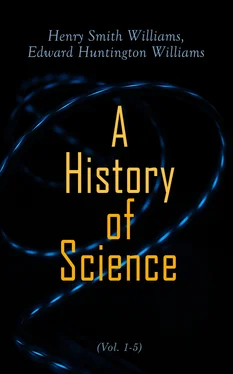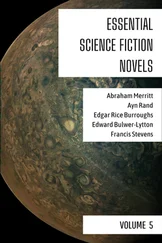There is a distinction here, it will be observed, which at once suggests the modern distinction between physical processes and chemical processes, or, putting it otherwise, between molecular processes and atomic processes; but the reader must be guarded against supposing that Anaxagoras had any such thought as this in mind. His ultimate mixable particles can be compared only with the Daltonian atom, not with the molecule of the modern physicist, and his "infinite, self-powerful, and unmixable" particles are not comparable with anything but the ether of the modern physicist, with which hypothetical substance they have many points of resemblance. But the "infinite, self-powerful, and unmixed" particles constituting thus an ether-like plenum which permeates all material structures, have also, in the mind of Anaxagoras, a function which carries them perhaps a stage beyond the province of the modern ether. For these "infinite, self powerful, and unmixed" particles are imbued with, and, indeed, themselves constitute, what Anaxagoras terms nous, a word which the modern translator has usually paraphrased as "mind." Neither that word nor any other available one probably conveys an accurate idea of what Anaxagoras meant to imply by the word nous. For him the word meant not merely "mind" in the sense of receptive and comprehending intelligence, but directive and creative intelligence as well. Again let Anaxagoras speak for himself: "Other things include a portion of everything, but nous is infinite, and self-powerful, and mixed with nothing, but it exists alone, itself by itself. For if it were not by itself, but were mixed with anything else, it would include parts of all things, if it were mixed with anything; for a portion of everything exists in every thing, as has been said by me before, and things mingled with it would prevent it from having power over anything in the same way that it does now that it is alone by itself. For it is the most rarefied of all things and the purest, and it has all knowledge in regard to everything and the greatest power; over all that has life, both greater and less, nous rules. And nous ruled the rotation of the whole, so that it set it in rotation in the beginning. First it began the rotation from a small beginning, then more and more was included in the motion, and yet more will be included. Both the mixed and the separated and distinct, all things nous recognized. And whatever things were to be, and whatever things were, as many as are now, and whatever things shall be, all these nous arranged in order; and it arranged that rotation, according to which now rotate stars and sun and moon and air and aether, now that they are separated. Rotation itself caused the separation, and the dense is separated from the rare, the warm from the cold, the bright from the dark, the dry from the moist. And when nous began to set things in motion, there was separation from everything that was in motion, all this was made distinct. The rotation of the things that were moved and made distinct caused them to be yet more distinct."(3)
Nous, then, as Anaxagoras conceives it, is "the most rarefied of all things, and the purest, and it has knowledge in regard to everything and the greatest power; over all that has life, both greater and less, it rules." But these are postulants of omnipresence and omniscience. In other words, nous is nothing less than the omnipotent artificer of the material universe. It lacks nothing of the power of deity, save only that we are not assured that it created the primordial particles. The creation of these particles was a conception that for Anaxagoras, as for the modern Spencer, lay beyond the range of imagination. Nous is the artificer, working with "uncreated" particles. Back of nous and the particles lies, for an Anaxagoras as for a Spencer, the Unknowable. But nous itself is the equivalent of that universal energy of motion which science recognizes as operating between the particles of matter, and which the theologist personifies as Deity. It is Pantheistic deity as Anaxagoras conceives it; his may be called the first scientific conception of a non-anthropomorphic god. In elaborating this conception Anaxagoras proved himself one of the most remarkable scientific dreamers of antiquity. To have substituted for the Greek Pantheon of anthropomorphic deities the conception of a non-anthropomorphic immaterial and ethereal entity, of all things in the world "the most rarefied and the purest," is to have performed a feat which, considering the age and the environment in which it was accomplished, staggers the imagination. As a strictly scientific accomplishment the great thinker's conception of primordial elements contained a germ of the truth which was to lie dormant for 2200 years, but which then, as modified and vitalized by the genius of Dalton, was to dominate the new chemical science of the nineteenth century. If there are intimations that the primordial element of Anaxagoras and of Dalton may turn out in the near future to be itself a compound, there will still remain the yet finer particles of the nous of Anaxagoras to baffle the most subtle analysis of which to-day's science gives us any pre-vision. All in all, then, the work of Anaxagoras must stand as that of perhaps the most far-seeing scientific imagination of pre-Socratic antiquity.
LEUCIPPUS AND DEMOCRITUS
But we must not leave this alluring field of speculation as to the nature of matter without referring to another scientific guess, which soon followed that of Anaxagoras and was destined to gain even wider fame, and which in modern times has been somewhat unjustly held to eclipse the glory of the other achievement. We mean, of course, the atomic theory of Leucippus and Democritus. This theory reduced all matter to primordial elements, called atoms (gr atoma) because they are by hypothesis incapable of further division. These atoms, making up the entire material universe, are in this theory conceived as qualitatively identical, differing from one another only in size and perhaps in shape. The union of different-sized atoms in endless combinations produces the diverse substances with which our senses make us familiar.
Before we pass to a consideration of this alluring theory, and particularly to a comparison of it with the theory of Anaxagoras, we must catch a glimpse of the personality of the men to whom the theory owes its origin. One of these, Leucippus, presents so uncertain a figure as to be almost mythical. Indeed, it was long questioned whether such a man had actually lived, or whether he were not really an invention of his alleged disciple, Democritus. Latterday scholarship, however, accepts him as a real personage, though knowing scarcely more of him than that he was the author of the famous theory with which his name was associated. It is suggested that he was a wanderer, like most philosophers of his time, and that later in life he came to Abdera, in Thrace, and through this circumstance became the teacher of Democritus. This fable answers as well as another. What we really know is that Democritus himself, through whose writings and teachings the atomic theory gained vogue, was born in Abdera, about the year 460 B.C.—that is to say, just about the time when his great precursor, Anaxagoras, was migrating to Athens. Democritus, like most others of the early Greek thinkers, lives in tradition as a picturesque figure. It is vaguely reported that he travelled for a time, perhaps in the East and in Egypt, and that then he settled down to spend the remainder of his life in Abdera. Whether or not he visited Athens in the course of his wanderings we do not know. At Abdera he was revered as a sage, but his influence upon the practical civilization of the time was not marked. He was pre-eminently a dreamer and a writer. Like his confreres of the epoch, he entered all fields of thought. He wrote voluminously, but, unfortunately, his writings have, for the most part, perished. The fables and traditions of a later day asserted that Democritus had voluntarily put out his own eyes that he might turn his thoughts inward with more concentration. Doubtless this is fiction, yet, as usual with such fictions, it contains a germ of truth; for we may well suppose that the promulgator of the atomic theory was a man whose mind was attracted by the subtleties of thought rather than by the tangibilities of observation. Yet the term "laughing philosopher," which seems to have been universally applied to Democritus, suggests a mind not altogether withdrawn from the world of practicalities.
Читать дальше












